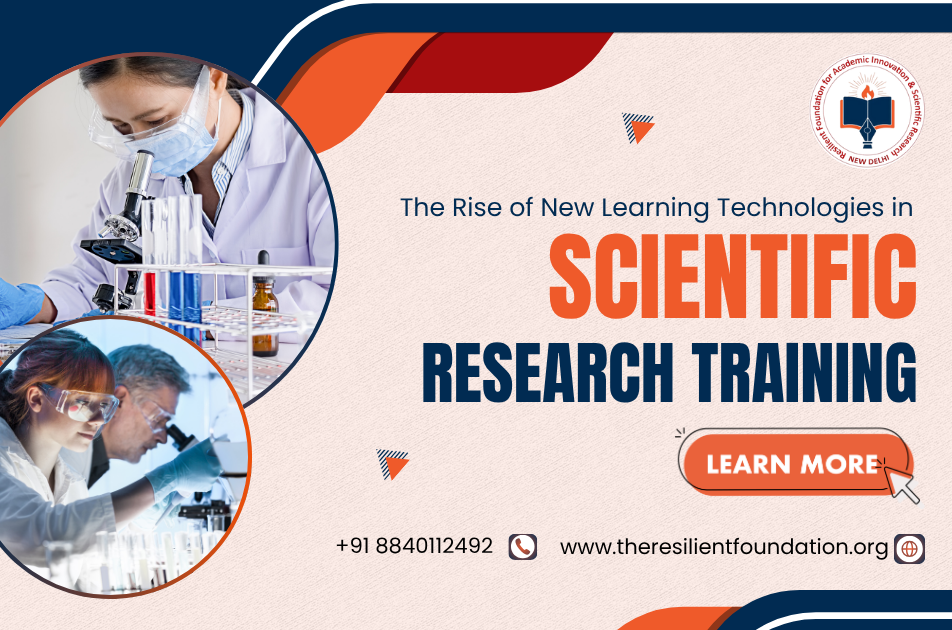In recent years, new learning technologies have changed how scientific research is taught and learned. Also, these technologies are improving the way research is done, which is making it easier for scientists to learn and grow in their field. Such as with tools like AI and digital platforms, scientists can learn faster and more effectively, thus making big strides in scientific innovation.
Scientific Research Training with Modern Digital Learning Tools
These days, many smart tools are being used in scientific research training. So, let’s take a look at how these new learning technologies are helping in simple, clear ways:
- Virtual Labs: Students can now perform lab experiments online. Thus, this saves time, money, and resources. Also, it helps them learn without waiting for physical lab access.
- Online Webinars: Many universities and groups like the Resilient Foundation offer easy-to-understand online training in scientific research.
- Interactive Learning Apps: New teaching technology provides videos, quizzes, and simulations that help learners learn faster and better.
- AI Tutors: Used AI in scientific learning to guide students, check their work, and suggest improvements.
- Cloud Storage and Data Tools: These help researchers save and manage large amounts of information quickly, which speeds up scientific innovation.
Because of these tools, learning has become more practical, engaging, and result-oriented.
Key Learning Technologies Revolutionising Research Training
Some important new learning technologies are now changing how we train future researchers. Because these tools are simple but very powerful:

- LMS (Learning Management Systems): These systems help trainers share content, take tests, and track student progress in scientific research courses.
- Virtual Reality (VR): With VR, students can see and interact with 3D models of cells, machines, or experiments. It is an exciting part of the new teaching technology.
- AI-based Research Platforms: These platforms support AI in scientific learning by analysing papers, finding errors, and even suggesting better methods.
- Data Analysis Software: Researchers are using tools like R, Python, and Excel to work faster and smarter, pushing scientific innovation ahead.
These tools are not just helping students learn; they are shaping a better future for global research.
Benefits of Using New Technologies in Scientific Research Training
There are many good things about using new learning technologies. Because they help students and teachers in many ways:
- Learn from Anywhere: Before, only students in big cities could get good training. But now, with the internet and apps, anyone can learn scientific research from home or anywhere.
- Learn at Your Speed: Not all students learn fast. Some need more time. With new teaching technology, students can watch lessons again or pause anytime. So, it helps them understand better.
- Do Practice Without Real Lab: Virtual labs help students do science work online. Also, this gives them real experience. In addition, it also helps in AI in scientific learning.
- Save Time and Money: Online learning saves travel time and class costs. So, students can finish lessons quickly. Because they get more time to focus on scientific innovation.
- Learn More Skills: These tools teach many skills like using data, doing research, and thinking clearly. So, students feel more ready for the future.
FAQs
Q1: How are new learning technologies helping students in scientific research?
A: These tools help students learn in easy ways. They can watch videos, try virtual labs, and take quizzes. So, this makes scientific research fun and simple.
Q2: Is AI in scientific learning reliable for beginners?
A: Yes. AI tools help students step by step. AI in scientific learning gives tips, finds mistakes, and helps you learn faster.
Q3: Can I start learning scientific research online without going to a lab?
A: Yes. You can learn from online courses and practice with virtual labs. The Resilient Foundation offers great programs for students who want to study and grow in scientific innovation.
Preparing Researchers with Smarter Learning Tools
The Resilient Foundation understands that today’s researchers need more than just theory. So, they need tools, support, and smart learning methods. That’s why it offers modern programs using new learning technologies to help students grow. Here’s how:
- Online Workshops with Practical Tools: These workshops include real-time tools for scientific research training, making learning useful and enjoyable.
- Expert-Led Courses: Learn from professionals who explain new teaching technology in easy ways, so every learner feels confident.
- AI Support in Learning: The Foundation uses AI in scientific learning to guide students with personalised tips and practice.
- Innovation-Focused Training: Every program is built to support scientific innovation, encouraging new ideas and solutions.
- Accessible Learning Anytime, Anywhere: No matter where you live, Resilient Foundation helps you become a better researcher at your own pace.
If you’re ready to explore the future of science, then Resilient Foundation gives you the right tools to begin.

